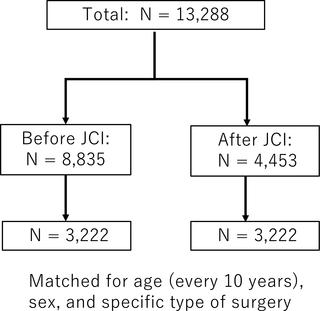PLOS ONE ( IF 2.9 ) Pub Date : 2018-09-21 , DOI: 10.1371/journal.pone.0204301 Takenori Inomata , Ju Mizuno , Masao Iwagami , Shiori Kawasaki , Akie Shimada , Eiichi Inada , Tina Shiang , Atsushi Amano

|
The Joint Commission International (JCI) is responsible for upholding standards in healthcare and organizations in compliance receive accreditation. JCI requires quality improvement on patient safety goals, but requirements may prolong the total procedure/surgery time and reduce efficiency. Here, we evaluate the impact of JCI requirements on time periods in the operating room. We included patients who received elective and emergency surgeries under general anesthesia at Juntendo University Hospital between December 2014 and June 2016. Patients were classified as before and after JCI accreditation on December 12, 2015. The primary outcome was total procedure/surgery time. Secondary outcomes include five time periods comprising the total procedure/surgery time: pre-anesthesia time, anesthesia induction time, procedure/surgery time, anesthesia awareness time and post-anesthesia time. We compared these time periods between patients before and after JCI accreditation and patients were matched for age, sex and the specific type of surgery. Although total procedure/surgery time did not change significantly, pre-anesthesia time significantly increased (8.2 ± 6.9 minutes vs. 8.5 ± 6.9 minutes, before vs. after JCI, respectively, p = 0.028) and anesthesia induction time significantly decreased (34.4 ± 16.1 minutes vs. 33.6 ± 15.4 minutes, before vs. after JCI, respectively, p = 0.037) after JCI accreditation. Other secondary study outcomes did not change significantly. Quality improvement initiatives associated with time periods in the operating room can be achieved without undermining efficiency.
中文翻译:

联合委员会国际认证对手术室时间段的影响:一项回顾性观察研究
国际联合委员会(JCI)负责在医疗保健和组织中维护合规性标准,以符合获得认可的要求。JCI要求提高患者安全性目标的质量,但要求可能会延长整个过程/手术时间并降低效率。在这里,我们评估了JCI要求对手术室时间段的影响。我们纳入了在2014年12月至2016年6月期间在Juntendo大学医院接受全身麻醉的择期和急诊手术的患者。患者于2015年12月12日获得JCI认证之前和之后分类。主要结果是总手术时间/手术时间。次要结局包括五个时间段,包括整个手术/手术时间:麻醉前时间,麻醉诱导时间,手术/手术时间,麻醉意识时间和麻醉后时间。我们比较了JCI认证前后患者之间的这些时间段,并根据年龄,性别和特定手术类型对患者进行了匹配。尽管总手术时间/手术时间没有明显变化,但麻醉前时间显着增加(8.2±6.9分钟vs. 8.5±6.9分钟,分别在JCI之前和之后,p = 0.028)和麻醉诱导时间显着减少(34.4±在JCI认证之后,分别为16.1分钟和33.6±15.4分钟,分别在JCI之前和之后,p = 0.037)。其他中学研究结果没有明显变化。可以在不影响效率的情况下实现与手术室时间段相关的质量改进计划。我们比较了JCI认证前后患者之间的这些时间段,并根据年龄,性别和特定手术类型对患者进行了匹配。尽管总手术时间/手术时间没有明显变化,但麻醉前时间显着增加(8.2±6.9分钟vs. 8.5±6.9分钟,分别在JCI之前和之后,p = 0.028)和麻醉诱导时间显着减少(34.4±在JCI认证之后,分别为16.1分钟和33.6±15.4分钟,分别在JCI之前和之后,p = 0.037)。其他中学研究结果没有明显变化。可以在不影响效率的情况下实现与手术室时间段相关的质量改进计划。我们比较了JCI认证前后患者之间的这些时间段,并根据年龄,性别和特定手术类型对患者进行了匹配。尽管总手术时间/手术时间没有明显变化,但麻醉前时间显着增加(8.2±6.9分钟vs. 8.5±6.9分钟,分别在JCI之前和之后,p = 0.028)和麻醉诱导时间显着减少(34.4±在JCI认证之后,分别为16.1分钟和33.6±15.4分钟,分别在JCI之前和之后,p = 0.037)。其他中学研究结果没有明显变化。可以在不影响效率的情况下实现与手术室时间段相关的质量改进计划。尽管总手术时间/手术时间没有明显变化,但麻醉前时间显着增加(8.2±6.9分钟vs. 8.5±6.9分钟,分别在JCI之前和之后,p = 0.028)和麻醉诱导时间显着减少(34.4±在JCI认证之后,分别为16.1分钟和33.6±15.4分钟,分别在JCI之前和之后,p = 0.037)。其他中学研究结果没有明显变化。可以在不影响效率的情况下实现与手术室时间段相关的质量改进计划。尽管总手术时间/手术时间没有明显变化,但麻醉前时间显着增加(8.2±6.9分钟vs. 8.5±6.9分钟,分别在JCI之前和之后,p = 0.028)和麻醉诱导时间显着减少(34.4±在JCI认证之后,分别为16.1分钟和33.6±15.4分钟,分别在JCI之前和之后,p = 0.037)。其他中学研究结果没有明显变化。可以在不影响效率的情况下实现与手术室时间段相关的质量改进计划。分别获得JCI认证后的p = 0.037)。其他中学研究结果没有明显变化。可以在不影响效率的情况下实现与手术室时间段相关的质量改进计划。分别获得JCI认证后的p = 0.037)。其他中学研究结果没有明显变化。可以在不影响效率的情况下实现与手术室时间段相关的质量改进计划。











































 京公网安备 11010802027423号
京公网安备 11010802027423号